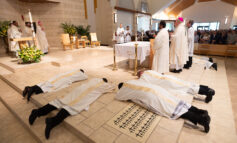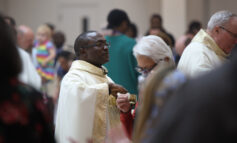By Father John Bayer
Special to The Texas Catholic
I recently presided at a funeral for a child who was stillborn. In preparing, I became convinced that such children and their parents are powerful witnesses to Christian faith. In this column, I’d like to reflect on these children, and in the next two columns on their parents.
When people die after long lives, we sometimes limit our sadness by turning their funerals into “celebrations of life” by sharing endearing stories about them, and sometimes we can even experience gratitude that the person is at rest after a difficult illness. But what do we “celebrate” for children who didn’t have much chance to live?
Here we can’t avoid a provocative encounter with death. Whenever it strikes prematurely, its apparent senselessness splits open. It tempts us to doubt the meaning of life, as we become confused about what it means to be a person. In our society, we are tempted to believe that to be a person is to be independent, dynamic and virtuous, and, indeed, an “actualized” person will possess such qualities. But these qualities are accidental – that is, they can come and go in all of us and at any age. The sensitivity of hearts and the brilliance of minds can fade through disease. Powerful wills can be rendered utterly dependent through handicap. Indeed, the course of our life precisely as persons is not a constant ascent into excellence. On the contrary, the longer we live, the more we find ourselves just as dependent as a child in the womb, as others feed and care for us until the end.
Culturally, we are often taught to disdain dependency. This is perhaps most frightfully obvious when laws promote abortion and euthanasia, or the elimination of some of the most dependent among us. Sadly, many people try to justify such destruction by appealing to “human dignity”. Little do they see how their appeal sets the bar for human dignity at a level that only the strong and independent can reach — for now!
Against this depravity stands the eloquent witness of little souls and the parents who love them and hope to be with them in heaven. These souls show us what it really means to be a person. To be a person is to be an image of God — to be a creature defined by relationships of eternal love. Little souls are all images of God simply by existing from their conception. God loves them all by name. The communion of saints in the Church loves them all. Their mothers nourish them even before knowing them consciously. Many are also blessed with families excitedly waiting for them and desiring their baptism.
Receiving love before their consciousness matured, these little souls reflect how God loves us all. If a woman can feed and love her unborn child, how much more can the Creator nourish and love us despite our inability to comprehend him? We are like babies before God: loved and in relation with him before any achievement or matured understanding, cherished by him because of his goodness and power rather than our own.
Catholic faith of course sees how we are — in part — determined by the exercise of our intellect and freedom. But it also acknowledges we are determined by prior realities that even shape our intellect and freedom. Intercession, indulgences, and the entire economy of grace have real effects upon us. In so many ways, we are not our own. Consider how the Catechism trusts in the power of parents and godparents to extend faith into the child they present for baptism (CCC 1253). Baptism, the sacrament of conversion and new life in Christ, can be given to a baby because his heart is in a mysterious way connected to the Church. “No man is an island,” says the poet. The Church knows just how marvelously true this is. These little souls are not islands. By the love of their family and friends, and above all by God, they share in far more than their development would suggest.
“In my Father’s house there are many dwelling places” (Jn 14:2). Following the Catechism, we can hope that God’s salvation extends to children who die without baptism (CCC 1261). Among the dwelling places he has prepared, it makes sense that there are those for children whose time on earth did not allow them to reach the heights of human ability. Actually, there may be special places for these children. For the smaller we are, the more we must rely upon God, and so the more we draw down his special attention. Jesus insists, “Let the children come to me” (Mk 10:13-15). Like other religions and philosophies, Christianity affirms human achievement and honors those who seek God with all their powers. But the magnificent Gospel we preach as Christians is that underneath all our striving is God’s own striving for us: the more basic and determinative truth is that God’s love for us is what enables us to love him, that he loves us before we can love him, like babies in the womb.
If you or parents you know are suffering the premature death of a child, know that there are ministries and resources, such as Mary’s Mantle (marysmantleministry@gmail.com) and those listed on the websites of the Catholic Pro-Life Community and Natural Womanhood.
Father John Bayer, O. Cist., is a monk at the Cistercian Abbey of Our Lady of Dallas in Irving.



